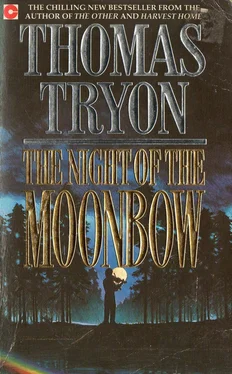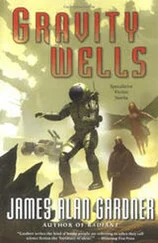Thomas Tryon - The Night of the Moonbow
Здесь есть возможность читать онлайн «Thomas Tryon - The Night of the Moonbow» весь текст электронной книги совершенно бесплатно (целиком полную версию без сокращений). В некоторых случаях можно слушать аудио, скачать через торрент в формате fb2 и присутствует краткое содержание. Жанр: Триллер, на английском языке. Описание произведения, (предисловие) а так же отзывы посетителей доступны на портале библиотеки ЛибКат.
- Название:The Night of the Moonbow
- Автор:
- Жанр:
- Год:неизвестен
- ISBN:нет данных
- Рейтинг книги:3 / 5. Голосов: 1
-
Избранное:Добавить в избранное
- Отзывы:
-
Ваша оценка:
- 60
- 1
- 2
- 3
- 4
- 5
The Night of the Moonbow: краткое содержание, описание и аннотация
Предлагаем к чтению аннотацию, описание, краткое содержание или предисловие (зависит от того, что написал сам автор книги «The Night of the Moonbow»). Если вы не нашли необходимую информацию о книге — напишите в комментариях, мы постараемся отыскать её.
The Night of the Moonbow — читать онлайн бесплатно полную книгу (весь текст) целиком
Ниже представлен текст книги, разбитый по страницам. Система сохранения места последней прочитанной страницы, позволяет с удобством читать онлайн бесплатно книгу «The Night of the Moonbow», без необходимости каждый раз заново искать на чём Вы остановились. Поставьте закладку, и сможете в любой момент перейти на страницу, на которой закончили чтение.
Интервал:
Закладка:
“ ‘All right, all right,’ ” Pa said when the hilarity subsided, imitating the familiar nasal monotone of radio’s famous
Major Bowes as he gave the “Wheel of Fortune” a good spin. “ ‘Round and round she goes, and where she stops, nobody knows,’ ” and the sock and buskin were passed along at last to the Jeremians. After a positive bouquet of an introduction, which wilted from its very floweriness, Pa announced the title: “The Doctor Is Definitely In,” or “Oh, Doc, You Struck a Nerve,” and no sooner had the performance begun than everyone in the audience knew that here was surely the hit of the evening.
The stage curtains parted to reveal a large bedsheet stretched taut across a wooden frame. A spotlight from behind illuminating this makeshift screen, and there appeared upon it the silhouette of a figure who pantomimed being afflicted with a bad stomach ache. Next, the audience was treated to the sight of a buxom nurse featuring an oversized poitrine and derriere, who assisted the patient in ridding himself of his coat, then proceeded to take his temperature with a three-foot-long outdoor thermometer. The nurse (the Bomber) grew considerably agitated, while the patient (Monkey Twitchel) became sicker by the moment. Presently an offstage bell rang and a voice announced “Dr Mackinschleisser – call sur-ger-ee.”
Now onto the sheet were tossed the capering shadows of three assistants (Fiske and Dillworth, and one shorter than the rest – Abernathy, of course), and the nurse proceeded with a remarkable amount of ado to scrub up, using a jumbo sponge and a basin the size of a potato tub. Ablutions completed, the three assistants heaved the protesting patient onto the operating table, then stumbled over one another getting out of the way as the gangly silhouette of the doctor was catapulted onto the screen as though shot from a cannon. Tall, thin, and of an antic disposition, Dr Mackinschleisser, hero of the piece, was rendered the more hilarious by his very two-dimensionality. Alternately tipping his Derby like a boulevardier and furiously twirling his furled umbrella, which he spun between his fingers like a drum major’s baton, he brought down the house as soon as he appeared onstage. By the time he had executed the complex business of removing his gloves – starting each fingertip with a neat clip of his choppers, and finally rolling the gloves into a ball, popping them into his mouth, and devouring them – tears of laughter could be observed. Now, opening his Gladstone bag, the doctor pulled out a stethoscope, whose rubber cords he first snapped at the nurse’s behind, then got stuck in his eye as he attempted to fit the instrument into his ears. Keenly listening to the patient’s heartbeat, he wagged a disconsolate head: the prognosis was bad. Not so bad, however, that the patient might not once or twice lift his head from the table, for which trouble he received a whack with the doctor’s oversized mallet.
At last, after some tricky mathematical calculations with a jumbo set of calipers upon the patient’s chest, presumably to determine the location of the heart, the incision was made (by means of the vigorous employment of a lumberman’s cross-cut saw), the body cavity was exposed (held open by a pair of carpenter’s clamps), and the doctor proceeded to remove the sundry causes of the patient’s discomfort: a pair of hip boots, a baseball bat, a hot-water bottle, a tennis racket with three balls, a pocketbook, some ladies’ hosiery, a string of breakfast sausages, a toilet plunger, assorted crockery, cutlery, and cookware, a head of cabbage, a waiter’s tray, plus yards of stuffing which even in silhouette looked suspiciously like excelsior. Finally, after further intensive probing, there followed a baby by the heels, crying, for which pains it received a stiff whack with the mallet.
“My dolly! Don’t hurt her!” came an anxious cry from the audience.
“Hush, Willa-Sue,” Ma was heard to say, “he’s only doing make-believe. ”
The child’s outburst earned another laugh, serving to remind the audience that the performer, the comical Dr Mackinschleisser, was none other than Wacko Wackeem, actor extraordinaire, who now invited his patient to take a bow (thanks to the surgeon’s wide medical experience, he had made a “full recovery”). As the cast reassembled and took its bows in front of the curtain, there was no question: Jeremiah had no rival in the skit department.
But there was still more to come: after a brief intermission, during which the actors shed their costumes and resumed their seats in the audience, Henry Ives sheepishly shuffled on and read from his copy of Chic Sale’s book of backhouse humor, then played his one-man band. This entertainment was followed by Pa on his jazz whistle with “Yes, We Have No Bananas,” and “Don’t Bring Lulu,” and Wiggy Pugh’s rendition of “I Can’t Get Started” on the same cornet he used for sounding taps. Next on was Charlie Penny, Job’s counselor, in a cowboy hat and neckerchief, twirling a lariat and telling Will Rogers jokes, after which Ezekiel’s counselor, Peter Melrose, led the camp chorus in “Darktown Strutters’ Ball” and “Sleepytime Down South,” inviting the audience to sing along.
Knowing that his solo violin performance was to follow this act, Leo circled around to the back of the room, where he had left his violin case. His bow had been rosined, the violin tuned, so he had only to wait to be introduced. When he heard Pa announce his name, with an awkward shift of limbs, he circled behind the audience to the stage. There was a murmur of anticipation as Pa announced the first selection, “In a Monastery Garden” by Ketelby, a piece Leo knew well, and the audience stirred in their seats, falling silent when, hunching his shoulders, Leo raised his violin, tucked it under his chin, lifted the bow, and began to play.
For the first few moments he had to fight the attack of nerves that always besieged him when he played on stage, but, presently, he experienced a familiar lift of spirits, that welcome sense of authority that seemed to carry him out of himself. He had only to give himself up to his deepest instincts and play the best he knew how. As his bow drew forth the deep, rich melody, his eyes roamed the faces of his audience, then the section reserved for the Harmony unit, where Tiger and the Bomber sat among the other Jeremians. Across the tip of the moving bow, he saw the look of rapt anticipation on their faces, as if they were just waiting for Leo to show what he could do. But at that moment Leo was most aware of Dagmar Kronborg, who sat calmly in her place, her eyes alive with interest, a bit quizzical, but appreciative. He could tell from her frequent nods that she approved, and this heartened him, spurring him to play his absolute best. Well, he thought, as he approached the final bars of the piece, it’s all going well – as well as he’d hoped it would. First the skit, now his own recital.
When the number ended, the applause was generous, the audience eager for more. Leo made a brief adjustment to his strings, tested them once or twice, and prepared himself for his encore. The room fell quickly silent. He had started to raise his instrument and slide it in under his chin again w'hen a loud sound was heard at the entrance; the double screen doors had opened, then slammed with a clatter. Heads turned at the disturbance, and a murmur of recognition swept through the crowd. The newcomer was Reece Hartsig. With him was Honey, her waist encircled by his arm. Appearing to enjoy the stir their entrance had caused, Reece tipped his cap in greeting to Ma and winked at Dagmar. He made no attempt to sit down but rather, keeping Honey close beside him, remained standing in full view of all, lounging against a post as he looked toward the stage.
Читать дальшеИнтервал:
Закладка:
Похожие книги на «The Night of the Moonbow»
Представляем Вашему вниманию похожие книги на «The Night of the Moonbow» списком для выбора. Мы отобрали схожую по названию и смыслу литературу в надежде предоставить читателям больше вариантов отыскать новые, интересные, ещё непрочитанные произведения.
Обсуждение, отзывы о книге «The Night of the Moonbow» и просто собственные мнения читателей. Оставьте ваши комментарии, напишите, что Вы думаете о произведении, его смысле или главных героях. Укажите что конкретно понравилось, а что нет, и почему Вы так считаете.












